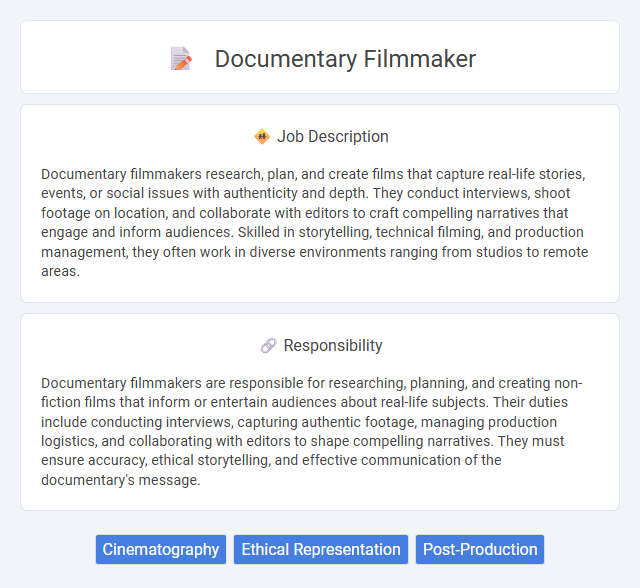
Documentary filmmakers research, plan, and create films that capture real-life stories, events, or social issues with authenticity and depth. They conduct interviews, shoot footage on location, and collaborate with editors to craft compelling narratives that engage and inform audiences. Skilled in storytelling, technical filming, and production management, they often work in diverse environments ranging from studios to remote areas.
Documentary filmmaking likely suits individuals with a strong curiosity about social issues and empathy toward diverse human conditions, as the job often requires engaging deeply with people's stories and experiences. Those who can handle unpredictable schedules, emotional intensity, and extended periods of research and filming may find themselves more compatible with the profession. A high degree of resilience and adaptability probably enhances success, given the challenges of capturing authentic narratives under various environmental and cultural circumstances.
Qualification
A documentary filmmaker typically holds a bachelor's degree in film production, media studies, or communications, with strong skills in storytelling, research, and video editing software like Adobe Premiere Pro and Final Cut Pro. Experience in cinematography, sound recording, and scriptwriting enhances the ability to produce compelling and visually engaging documentaries. Proficiency in project management and knowledge of distribution platforms such as Netflix or National Geographic increases career opportunities in this competitive field.
Responsibility
Documentary filmmakers are responsible for researching, planning, and creating non-fiction films that inform or entertain audiences about real-life subjects. Their duties include conducting interviews, capturing authentic footage, managing production logistics, and collaborating with editors to shape compelling narratives. They must ensure accuracy, ethical storytelling, and effective communication of the documentary's message.
Benefit
A career as a documentary filmmaker often offers the benefit of creative freedom, allowing individuals to explore impactful stories and raise awareness about important social issues. There is a strong probability of personal fulfillment through the ability to influence public opinion and inspire change. Financial rewards may vary, but opportunities for recognition and professional growth are commonly associated with successful projects.
Challenge
Documentary filmmakers likely face challenges such as securing funding and navigating ethical dilemmas related to truthful storytelling. They probably encounter difficulties in gaining access to subjects and locations that are crucial for authentic narratives. Managing unpredictable situations during filming might also be a common obstacle in producing compelling documentaries.
Career Advancement
Documentary filmmakers enhance their careers by building a strong portfolio of compelling films that showcase storytelling and technical skills. Networking within film festivals, production companies, and media platforms creates opportunities for funding and larger projects. Specializing in niches like environmental or social justice documentaries can lead to recognition and leadership roles in the industry.
Key Terms
Cinematography
Documentary filmmakers specializing in cinematography skillfully capture authentic moments that convey compelling narratives through visual storytelling. They use advanced camera techniques, lighting, and framing to enhance the emotional impact and realism of the documentary. Proficiency in digital cameras, lenses, and post-production editing software like Adobe Premiere Pro or DaVinci Resolve is essential for producing high-quality cinematic footage.
Ethical Representation
Documentary filmmakers must prioritize ethical representation by ensuring accuracy, respecting subjects' dignity, and avoiding exploitation. They adhere to principles of informed consent and transparency to build trust with their audience and subjects. This ethical approach enhances credibility and social impact while maintaining professional integrity.
Post-Production
Documentary filmmakers specializing in post-production manage the crucial editing phase, transforming raw footage into a compelling narrative that aligns with the director's vision. Expertise in software such as Adobe Premiere Pro, Final Cut Pro, and DaVinci Resolve ensures seamless integration of visual effects, sound design, and color grading to enhance storytelling. Attention to detail in pacing, continuity, and audio synchronization is essential for producing impactful documentaries that engage and inform audiences.
 kuljobs.com
kuljobs.com